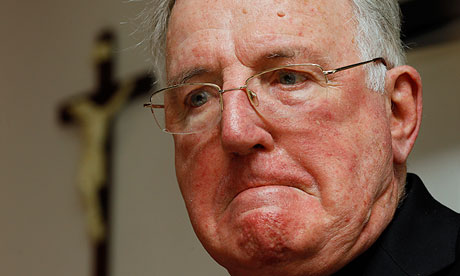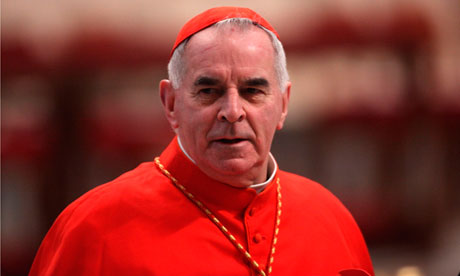
Vatican's 'own house has to be put in order' by pope, says Murphy-O'Connor
Former archbishop of Westminster urges 'renewal and reform in the church' as denies claim pope forced Cardinal O'Brien to quit
Severin Carrell and Sam Jones
The Guardian, Tuesday 26 February 2013 19.20 GMT

Cardinal Cormac Murphy-O'Connor said: 'There is no doubt that today there needs to be renewal in the church, reform in the church and especially of government.' Photograph: Kirsty Wigglesworth/AP
Senior Roman Catholics including the former archbishop of Westminster have urged the new pope to radically reform the Vatican in the wake of the resignation of the Scottish cardinal Keith O'Brien and other scandals.
Cardinal Cormac Murphy-O'Connor, former head of the Catholic church in England and Wales, said he believed the pope's "own house has to be put in order".
He added that many bishops and cardinals believed the entire church should be reformed by Benedict XVI's successor, with the pope taking a much less dominant role in the church, to give a greater say to its bishops. "It is not just the pope who rules the church," he said. "It is the pope with the bishops. "There is no doubt that today there needs to be renewal in the church, reform in the church and especially of government," he told a news conference in London. "How is this next pope going to govern the church?"
Murphy-O'Connor is now the only British cardinal who will take part in discussions before the conclave elects the new pope. However, he will only be an observer since he has passed the cut-off age of 80 for voting cardinals.
He also denied that O'Brien had been forced to resign by the pope.
On Monday, some 36 hours after the Observer disclosed that three priests and one former priest had formally accused him of misconduct against them – charges he denies – O'Brien stunned Scotland's Catholics by suddenly resigning.
In his resignation statement, O'Brien said he had originally been given the pope's approval to retire at a future date – due to be 17 March – after he tendered his resignation last year because of age and ill health. Confirming he would no longer attend the Vatican conclave, O'Brien then stated: "The holy father has now decided that my resignation will take effect today, 25 February 2013."
Despite that statement, Murphy-O'Connor claimed this had been solely O'Brien's decision: "As he said in his statement, I think he thought it would be a distraction to be in Rome. [It] was his decision to do so.
"He wasn't forced to do so; he wasn't asked to do so. He thought that given the publicity over the allegations, which are being contested by the cardinal, that was a better thing to do."
Senior sources in Scotland dispute that. It is understood the inquiry into the allegations began as soon as they were seen by the papal nuncio to the UK, Antonio Mennini, in early February. They said the Vatican had made it clear to O'Brien that he was in an untenable position, given the other serious scandals over child sexual abuse in other Catholic dioceses and the corruption allegations within the Vatican itself.
In a further development, the BBC reported that O'Brien was "very upset" by events over the last three days and claimed he was a "vulnerable" adult because of his age and ill health. A church source said the cardinal "doesn't know who his accusers are and doesn't know what they're accusing him of".
Professor John Haldane, a Vatican adviser and professor of moral philosophy at St Andrews university, said he agreed with Murphy-O'Connor that the church needed "overdue", wholesale reform.
Speaking on BBC Newsnight Scotland, hours after O'Brien resigned, he said: "The Vatican is a renaissance court. It's run on a basis that might have made sense in the 16th century but it certainly doesn't make sense in the 21st century.
"So very clearly one of the things the new pope has to do, and this is overdue, is really reform the internal organisation and structure of the church, and I think we will begin to see that."
Haldane said the formal inquiry into the allegations against O'Brien had already begun. "There are processes for dealing with these [situations] and these process are in hand, and that investigation is proceeding."

Allow Catholic priests to marry, urges Cardinal Keith O'Brien
Scottish Catholic leader says many struggle to cope with celibacy, as he prepares for trip to Rome to elect next pope
Press Association
The Guardian, Friday 22 February 2013 19.03 GMT

Cardinal Keith O'Brien says marriage was not considered when he was studying for the priesthood but added he would be happy to see it introduced. Photograph: Franco Origlia/Getty Images
The Scottish Catholic leader, Cardinal Keith O'Brien, has said he would be happy for priests to be able to marry. Many priests struggle to cope with celibacy and should be able to marry and have a family, he added, in advance of a trip to Rome where he will help elect the next pope.
O'Brien told the BBC: "I'd be very happy if others had the opportunity of considering whether or not they could or should be married. It's a free world and I realise many priests have found it very difficult to cope with celibacy as they lived out their priesthood, and felt the need of a companion, of a woman, to whom they could get married and raise a family."
O'Brien, 74, stood down from some frontline duties in the Roman Catholic church in Scotland last year due to his age.
He quit the position of Bishops' Conference of Scotland, the key decision-making body in the church.
He said marriage was not considered when he was studying for the priesthood but added he would be happy to see it introduced.
Cardinal O'Brien added:"I would like others to have the choice. In my time there was no choice, you didn't really consider it too much. It was part of being a priest when I was a young boy, priests didn't get married and that was it.
"When you were a student for the priesthood, well it was part of the package, as it were, that you were celibate, that you didn't get married and you didn't really consider it all that much, you just took your vows of celibacy the way someone else would naturally take their vows of marriage."
O'Brien welcomed Pope Benedict when he visited Scotland in 2010.
He has been an outspoken opponent of the Scottish government's plans to legalise same-sex marriage and was named "bigot of the year" by the gay rights charity Stonewall last November. It said he was given the title because he went "well beyond what any normal person would call a decent level of public discourse" in the debate.
The Catholic church criticised the charity's award, saying it revealed "the depth of their intolerance" and a willingness to demean people who do not share their views.
No comments:
Post a Comment